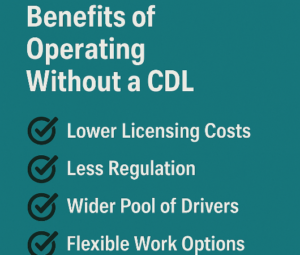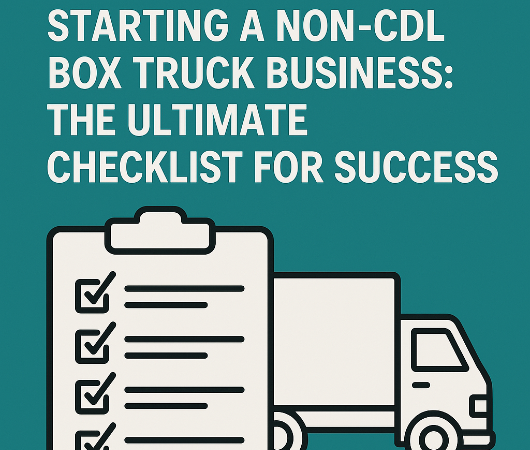Introduction
It is possible to start a non-CDL box truck business and end up loving it and finding it to be a worthwhile experience. Not only can it be profitable, but it can also give you the freedom to create a flexible schedule when you work. Before you go about taking this business venture, though, there are a lot of important things that you need to consider.
This checklist will guide you through the essential steps of starting a non-CDL box truck business. From obtaining necessary licenses and insurance to purchasing or renting a truck, we have you covered. We shall also discuss some essentials, such as establishing a business plan, promotion, and financing.
Whether you’re an entrepreneur planning to begin an enterprise or hoping to grow your current business venture, this list will provide a complete overview of the most significant points involved with establishing a profitable non-CDL box truck company.
What is a Non-CDL Box Truck?
A non-CDL box truck is a box truck that the driver does not require a CDL to operate. It typically weighs 10,000-26,000 pounds and is used for local or regional pickup and delivery. The trucks come in hundreds of sizes and configurations but most commonly are 14′, 16′, 20′, and 24′ long.
Understanding Your Target Market
It is crucial to know your target market before doing business. For a non-CDL box truck business, your target clients can be individuals or organizations that require their commodities transported locally or regionally. They can be small companies, retail stores, restaurants, and moving companies.
It is crucial to discover and learn about your target market’s special requirements. This will allow you to price and package your services on their terms. For instance, small businesses might need deliveries made more regularly and consistently than normal customers.
Second, by learning about trends in the market in your regional or local economy, you will have a point of reference compared to targets for future growth. Look at the industries that do business in your region and plan on targeting those industries as customers for your non-CDL box truck services.
Benefits of Operating Without a CDL

Running a non-CDL box truck company also has many benefits that make it a good choice for entrepreneurs. Among them are:
Lower Costs
One of the greatest benefits of owning a non-CDL box truck is its affordability. Getting a CDL can be expensive and time-consuming, particularly if you have to take training classes or sit for tests. By not needing a CDL, you can cut out all of this cost and concentrate on your business.
Flexibility in Hiring
Because you don’t need a CDL, you can be more open about hiring your non-CDL box truck company. You no longer have to hire someone with a CDL, which is great if you want people with certain skill sets or backgrounds. This allows people without a CDL to be hired and trained by your company.
Accessibility
Driving a non-CDL box truck also provides easier access to routes and deliveries. Commercial trucks are essentially banned in most places above a certain weight, but non-CDL box trucks are exempt from such. You can get into more areas and deliver more goods with ease.
Create a Solid Business Plan
If you intend to venture into a non-CDL box truck business, you will require a solid business plan. This involves conducting market research, identifying your target market and competition, setting financial goals and budgets, and creating a marketing strategy.
Formulate a Good Business Plan
A business plan will guide your business and help you make sound decisions. It must include your company’s mission, products or services, target market, financial projections, and operation plans.
Estimate start-up and operating expenses
It is very important to calculate your company’s startup and operation expenses prior to starting. These expenses encompass rent, equipment, stock, utilities, employee wages and salaries, advertisement, and other costs of doing business.
Choose a Business Structure (LLC, Sole Proprietor, etc.)
Once you have a clear idea of your business idea and cost, you will have to choose your business structure. The most common ones are sole proprietorship, partnership, limited liability company (LLC), corporation, and cooperative. Each has advantages and disadvantages, and hence, it is better to do some reading and consult with a financial or legal advisor prior to making up your mind.
Register Your Business
After choosing a business organization, you must register your business with the government. It is mostly a matter of obtaining a business license, tax ID, and licenses or certifications, depending on your requirements. Based on where you are and what kind of business you have, you might have some legislation and regulations that require you to register your business.
Business License
A Business license allows you to do business. You normally get it from the city or county government in which your business is located. The fee and means of acquiring it vary according to where you are, but they are normally available through the internet or through the mail.
Tax Identification Number
A tax identification number, or an Employer Identification Number (EIN), is a number issued by the Internal Revenue Service (IRS) and used to identify your business uniquely for tax purposes. Most businesses need a TIN/EIN if they have employees, are a corporation or partnership, or withhold taxes on payments other than wages made to a non-resident alien.
To obtain a TIN/EIN, you must fill out an application either online on the IRS website or by mail. It is free and ought to take a few minutes. Your TIN/EIN will be used for tax reporting purposes and other important business reasons,, such as opening bank accounts and obtaining business credit.
Choose a Business Structure (LLC, Sole Proprietor, etc.)
When beginning a business, the business form is the initial decision you will need to make. The most common business forms are sole proprietorship, partnership, corporation, and limited liability company (LLC). Each has its pros and cons, so it would be best to be aware of the differences among the forms prior to making a choice.
Sole Proprietorship
A sole proprietorship is the simplest type of business organization. One person or an individual owns and controls a sole proprietorship. One person has all the powers as an individual over the liability and duties of a business. In that case, if the business incurs failures or is taken to court in some form, assets belonging to the owner person could be placed at risk. But this type of business organization provides the owner the greatest extent of independence and autonomy since he possesses all the decision-making powers.
Partnership
A partnership is a business owned and operated by two or more individuals. Like a sole proprietorship, all of the partners are individually responsible for the business’s debts and liabilities. Other types of partnerships, however, do not offer the same protection against liability. A general partnership gives equal decision-making power and liability to all the partners. In contrast, a limited partnership gives the benefit of having a partner with limited liability and being involved in the firm as well.
Conclusion 70 words
Partnerships are very popular with businesses since they offer shared liability and responsibility. But you have to ensure that you look at the type of partnership you desire to obtain proper liability protection for all the partners. General partnerships can offer equal responsibility, but limited partnerships offer one partner limited liability, which can be helpful under certain circumstances. A clear and extensive partnership contract can help avoid potential misunderstandings or disagreements among partners. In most cases, partnerships could be a productive business arrangement as long as the right partners and proper handling by all are being considered. Thus, it is highly recommended that you thoroughly read and consult experts in the law field before concluding on what form of partnership your business will benefit from most.
FAQs
Q1: Is operating a box truck company without a CDL feasible?
A1: It is possible to begin a non-CDL box truck operation. Rules and regulations will differ based on your location and what freight you plan on hauling. Be sure you find and comprehend such regulations before entering into business.
Q2: What amount of capital is needed to begin this business?
A2: The cost to start a non-CDL box truck business can fluctuate greatly, depending on the truck’s cost, insurance, permits and licenses, and initial advertising. It is advisable to budget thoroughly and anticipate potential costs in advance before starting your business.

